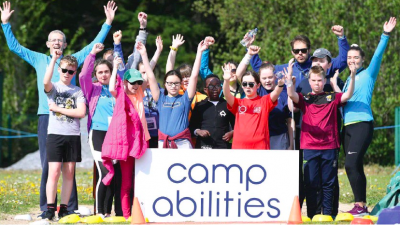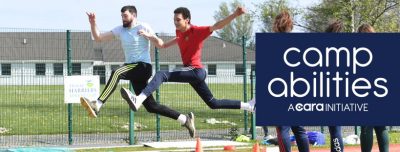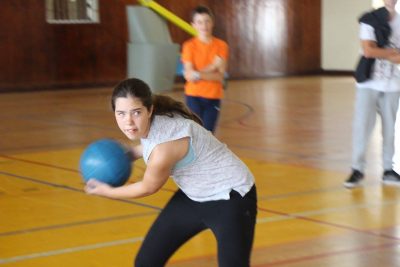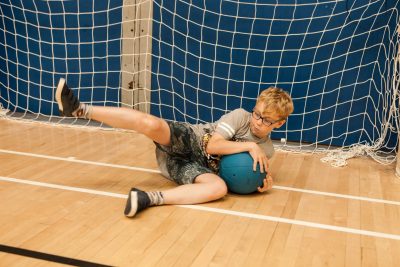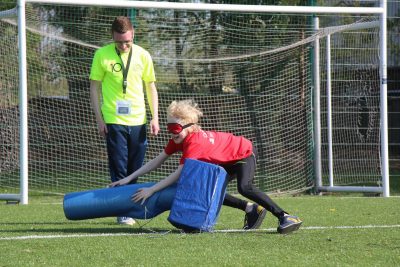By Lauren Lieberman.
After a whirlwind trip to Ghana, and four days at home, I set off for Ireland. Ghana is extremely hot and dry. Ireland is cool and wet. Ghana is also new to the world of Camp Abilities. Ireland has held a Camp Abilities for each of the last ten years. My goal, then, was to expand and educate professionals on the possibilities for our children who are blind or visually impaired.
I was hosted by the CARA Center and IT Tralee in Tralee. In 2007, the CARA Center and IT Tralee hosted the first Camp Abilities directed by Niamh Daffy and Ursula Barrett, who still help direct the camp ten years later. Niamh and Ursula kept me busy, but I’d like to share a few of the highlights.
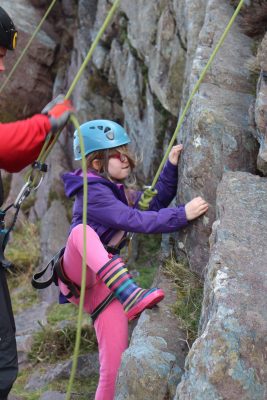
The Institute of Technology, Tralee
Located on the western coast of Ireland in the Kerry County, IT Tralee has a very strong Adapted Physical Education program housed within their Physical Education Major. The program includes Outdoor Adventure for People with Disabilities directed by Tomas Aylward. Students are given instruction for teaching children with disabilities sports such as kayaking, camping, and even surfing. I was thrilled to watch the amazing surfing program they held with their college students and young adults with intellectual disabilities! The water was cold, but the smiles were warming.
The CARA Center
The CARA Center is the fulfilment of Patrick Flanagan’s dream to promote inclusive and disability sport for people all over Ireland. Pat imagined – and achieved – a world where his son, who uses an electric wheelchair, could participate in anything he desired. CARA opened in 2000 with Sports Inclusion Disability Officers (SIDOS) in two of Ireland’s thirty-two counties. Now there are SIDOS in almost every county in the country.
I was excited to present at the European Outdoor Education Conference at IT Tralee. The theme was perfect: Diversity, Equality and Inclusion in Outdoor Adventure. The keynote speaker was my friend Erwin Borremanns. He is the director of Camp Abilities in Finland. There were 200 conference participants, representing 22 countries! Erwin and several other people gave dynamic presentations. Afterwards many people asked me how to start a Camp in their home country. What more could I ask! This was exactly the goal of the Fulbright Global Scholar Award.
Participation AND Achievement
At the conference I was able to present on a topic close to my heart and close to the Camp Abilities mission. Children who are blind or visually impaired deserve the right to participate in sport. But we should not stop at participation. There is a difference between participation and achievement. By focusing on achievement, we build our athlete’s confidence and open the door to a variety of competitive possibilities. While not every child can be a Paralympian, every child can reach their greatest potential. Every child can strive to run faster, throw farther and kick harder.
National Council for the Blind
After a hair-raising experience driving on the left-hand side of the road, Katrina and I arrived in Dublin where I was to speak at the National Council for the Blind. I presented research, practical ideas, and videos on how to include children with visual impairments into physical activity. Part of my presentation included research on college goalball teams.
My university (SUNY-Brockport) has a goalball team and I shared how empowering the teams are for players with and without visual impairments. I was dismayed when one of the participants stood and shared his belief that children who are blind should be playing sports available to the sighted world and not those specifically geared to the blind. He said there is no place for goalball in Irish Blind Sports.
Goalball
Goalball is a team sport designed specifically for athletes with a vision impairment. Participants compete in teams of three who try to throw a ball in the opponent’s goal. The ball is specially equipped with bells and is thrown by hand and never kicked.
Goalball is played in 81 nations and is a Paralympic sport. I have found that children love and excel at goalball.
Unfortunately, the beliefs of this one man, who was President of a national organization, prevented goalball from being played in most of Ireland. I was shocked to discover that most places in Ireland didn’t even have a goalball available. In America and around the world, a goalball is as popular as a soccer ball for children who are visually impaired. It’s disheartening to place any limitation on children with visual impairments.
It is my hope that soon goalball will be offered to the children of Ireland. Who knows, maybe Ireland can become a powerhouse in goalball like they are in football (soccer).
Parkrun
For those of you who know me, you know I love to run, and Ursula provided me the best-case scenario. Parkruns are free, weekly, timed 5K runs across the world, organized by local volunteers. Twenty-two countries are actively involved in the Parkrun organization. After you register, you are given a barcode and your results are recorded and the runner is offered advice on how to improve. Parkrun, like me, promotes both participation AND achievement.
At the race, I met Ross. Ross is blind and he attended the first ever Camp Abilities in Ireland. It was at this camp where he developed a love for running. The day I ran with Ross, he was racing in his 43rd Parkrun and would be running the Dublin marathon in two weeks.
I visit a lot of places. I do a lot of research and give a lot of presentations. But nothing – absolutely nothing – is more rewarding than meeting the kids who become adults who love and excel at sport. I was fortunate to see Ross at the next two Parkruns that I ran. He even remembered my time. We are now friends on Facebook, cheering each other to greater achievements.
Amanda and Advocacy
Part of my whirlwind experience was teaching at IT Tralee. While there I met Amanda. Amanda was a new student at the University, and she was visually impaired. She was also a Paralympic track runner. She was planning to study massage and aquatic therapy. I loved her enthusiasm, and passion for the field. I was dismayed when I was asked by the Department of Adapted Physical Activity to discuss possible adaptations for Amanda’s success in the program. I was shocked because I was invited – Amanda was not. They expected me to speak FOR Amanda.
It is my belief that we must be our own advocates. So, I took it upon myself to invite Amanda. It was her voice they needed to hear. Who knew better than Amanda what Amanda needed? She was nervous but she did it. She sat in an intimidating circle of professors and shared what was working for her and what other adaptations would be supportive. I listened, and so did they.
One of the staff’s primary concerns was how Amanda could handle a practical exam. How could she gain the visual information necessary to give feedback that is appropriate and safe?
Well, I had already addressed that issue at SUNY Brockport with my students with visual impairments and was able to offer some guidance. With her professor’s support Amanda implemented the adaptations and continues in her studies today. She made the Dean’s list this year! There have been some bumps along the way, but Amanda now has a voice. She learned how to be an advocate for herself and the staff at IT Tralee learned to seek the information from the best source. Win-win.
Olympic Training Center
I am often asked to give lectures and presentations. It is rewarding to reach a large group of professionals and decision makers. When I was asked to speak at The National Sports Center where the Olympian and Paralympians train to the National Governing Bodies of many Sports for Ireland, I was ecstatic. I spoke to Olympic coaches on Universal Design. While some of these coaches worked with Paralympians, many only coached able-bodied athletes. I enlightened these professionals on the potential of all athletes. I was able to stress one of my most important tenets: It’s not a disability but a different ability. I will not be surprised if Ireland recruits more athletes with disabilities because of this program!
One More Story
So much happened in Ireland, it would take weeks to tell you everything. We hosted a Camp Abilities in Portloaise where I learned Scootch. The game is played on a shuffleboard and is somewhat similar to bocce ball.
Red and black pucks are used as they contrast with the yellow floor, making it easier for children who are visually impaired to see. The kids, however, tended to hit the puck rather than glide the puck. The coach used sound at the cone to assist with direction. It was awesome to hear children scream and shout when they got close to the cone.
The coach for Scootch was visually impaired, as were her three children and her husband. She was a great teacher and encourager. It was fun to be “on the other side”.
But I have to circle back to goalball. I was the goalball coach in Portloaise and that is where I met Claire. When I first met her, her shoulders were slumped, and her hair covered her face. She told me she did not play sports.
Undaunted, I convinced her to try goalball. She could dive and throw like a Rockstar. Her ability to work with a team was astonishing. It was Claire who would jump into the game when someone needed a break. It was Claire screaming encouragement from the sidelines. It was Claire who walked off the court with her head held high.
I did a lot in Ireland. But nothing was better than Claire.
Gratitude
I couldn’t do this without support from so many. I’d like to thank the following for this amazing opportunity to work in Ireland.
- Ursula Barrett, Director, Camp Abilities Ireland
- Niamh Daffy, Director, Camp Abilities Ireland
- Erwin Borremanns, Director, Camp Abilities Finland
- Patrick Flanagan, Founder, The CARA Center
- Katie O’Connor, New Camp Abilities Ireland Director, Cappanalea Outdoor Center
~Lauren Lieberman

